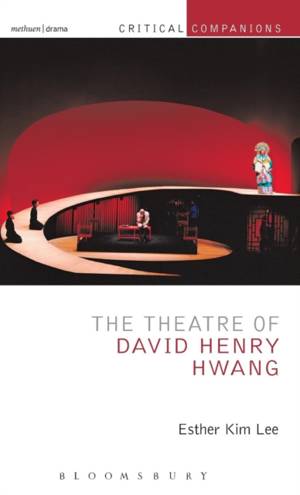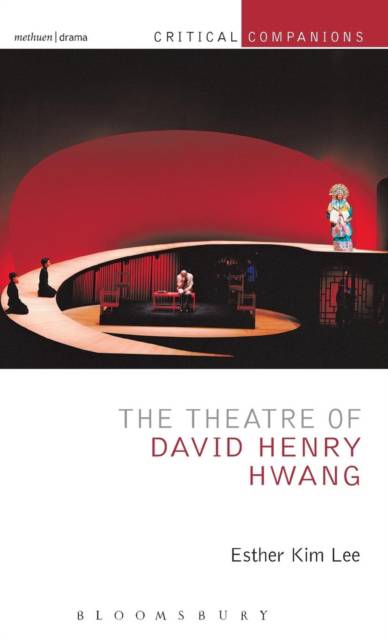
Bedankt voor het vertrouwen het afgelopen jaar! Om jou te bedanken bieden we GRATIS verzending (in België) aan op alles gedurende de hele maand januari.
- Afhalen na 1 uur in een winkel met voorraad
- In januari gratis thuislevering in België
- Ruim aanbod met 7 miljoen producten
Bedankt voor het vertrouwen het afgelopen jaar! Om jou te bedanken bieden we GRATIS verzending (in België) aan op alles gedurende de hele maand januari.
- Afhalen na 1 uur in een winkel met voorraad
- In januari gratis thuislevering in België
- Ruim aanbod met 7 miljoen producten
Zoeken
€ 220,45
+ 440 punten
Uitvoering
Omschrijving
Since the premiere of his play FOB in 1979, the Chinese American playwright David Henry Hwang has made a significant impact in the U. S. and beyond. The Theatre of David Henry Hwang provides an in-depth study of his plays and other works in theatre.
Beginning with his "Trilogy of Chinese America", Esther Kim Lee traces all major phases of his playwriting career. Utilizing historical and dramaturgical analysis, she argues that Hwang has developed a unique style of meta-theatricality and irony in writing plays that are both politically charged and commercially viable.
The book also features three essays written by scholars of Asian American theatre and a comprehensive list of primary and secondary sources on his oeuvre.
This comprehensive study of Hwang's work follows his career both chronologically and thematically. The first chapter analyzes Hwang's early plays, "Trilogy of Chinese America," in which he explores issues of identity and cultural assimilation particular to Chinese Americans. Chapter two looks at four plays characterised as "Beyond Chinese America," which examines Hwang's less known plays. Chapter three focuses on M. Butterfly, which received the Tony Award for Best Play in 1988. In chapter four, Lee explores Hwang's development as a playwright during the decade of the 1990s with a focus on identity politics and multiculturalism. Chapter five examines Hwang's playwriting style in depth with a discussion of Hwang's more recent plays such as Yellow Face and Chinglish. The sixth chapter features three essays written by leading scholars in Asian American theatre: Josephine Lee on Flower Drum Song, Dan Bacalzo on Golden Child, and Daphne Lei on Chinglish. The final section provides a comprehensive compilation of sources: a chronology, a bibliography of Hwang's works, reviews and critical sources.
Beginning with his "Trilogy of Chinese America", Esther Kim Lee traces all major phases of his playwriting career. Utilizing historical and dramaturgical analysis, she argues that Hwang has developed a unique style of meta-theatricality and irony in writing plays that are both politically charged and commercially viable.
The book also features three essays written by scholars of Asian American theatre and a comprehensive list of primary and secondary sources on his oeuvre.
This comprehensive study of Hwang's work follows his career both chronologically and thematically. The first chapter analyzes Hwang's early plays, "Trilogy of Chinese America," in which he explores issues of identity and cultural assimilation particular to Chinese Americans. Chapter two looks at four plays characterised as "Beyond Chinese America," which examines Hwang's less known plays. Chapter three focuses on M. Butterfly, which received the Tony Award for Best Play in 1988. In chapter four, Lee explores Hwang's development as a playwright during the decade of the 1990s with a focus on identity politics and multiculturalism. Chapter five examines Hwang's playwriting style in depth with a discussion of Hwang's more recent plays such as Yellow Face and Chinglish. The sixth chapter features three essays written by leading scholars in Asian American theatre: Josephine Lee on Flower Drum Song, Dan Bacalzo on Golden Child, and Daphne Lei on Chinglish. The final section provides a comprehensive compilation of sources: a chronology, a bibliography of Hwang's works, reviews and critical sources.
Specificaties
Betrokkenen
- Auteur(s):
- Uitgeverij:
Inhoud
- Aantal bladzijden:
- 224
- Taal:
- Engels
- Reeks:
Eigenschappen
- Productcode (EAN):
- 9781472512086
- Verschijningsdatum:
- 17/12/2015
- Uitvoering:
- Hardcover
- Formaat:
- Genaaid
- Afmetingen:
- 140 mm x 216 mm
- Gewicht:
- 399 g

Alleen bij Standaard Boekhandel
+ 440 punten op je klantenkaart van Standaard Boekhandel
Beoordelingen
We publiceren alleen reviews die voldoen aan de voorwaarden voor reviews. Bekijk onze voorwaarden voor reviews.









